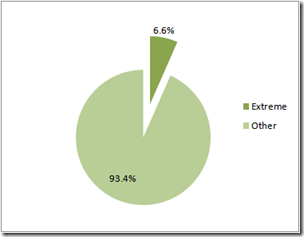Because We Agree On So Much
Excerpts from What 'Culture War'? by Dick Meyer, Los Angeles Times (August 27, 2008):
The idea that there is vast war over the moral and spiritual compass of the nation is a dramatic narrative, and it has dominated popular political analysis for nearly two decades. It makes for potent, inflammatory political commercials. It just doesn't have the added virtue of being true.
Poll after poll, focus group after focus group show that the vast majority of Americans — the Silent Majority, perhaps? — are pragmatic, independent and un-partisan in their basic views. They are eclectic: "liberal" on some matters, "conservative" on others.
In fact, it's because we agree on so much that our elections are so close.
Extremists, however rare, are becoming more common and, importantly, more rabid. Analyzing survey data from the National Opinion Research Center, political scientist Arthur Brooks discovered that the percentage of people who described themselves as either "extreme liberals" or "extreme conservatives" grew a stunning 35% from 1972 to 2004. Still, as a percentage of the total population, the extremist factions — right and left combined — remain a small slice, 6.6%.

The political elite and the politically engaged are, of course, much more likely to be on the extreme wings than the majority. These also happen to be the people who not only go to conventions, but whom the cable news bookers corral to argue about politics on their shows. Increasingly, they are also the people who host television and radio talk shows, who publish blogs and who make civic noise.
But they are not us. Despite the stories we will read, hear and see this week and next, Americans are a much more pragmatic, moderate and independent crowd.
- Why We Hate Us: American Discontent in the New Millennium by Dick Meyer
- Culture War? The Myth of a Polarized America by Morris P. Fiorina





